Who is JD Vance?
From a self-described hillbilly to one of the youngest VPs ever
On election night in 2022, JD Vance stood in front of a large crowd in Columbus, Ohio. With 95% of the votes counted, Vance had solidly defeated his Democratic opponent, Tim Ryan, a 10-term congressman.
Vance, a best-selling author and first time politician, addressed his supporters.
“We won a very good victory, and I’m very proud of it,” Vance said. “If you’re watching on TV, whether you voted for me or not, the thing that I promise you is to go to the United States Senate and fight every single day for the people of Ohio.”
Vance had gotten a last minute boost from Donald Trump during the primary, even though Vance had been critical of Trump in the past. (At one point, Vance compared Trump to Adolf Hitler, but later apologized for those comments after launching his Senate campaign. The audio of Vance saying “I’m a never-Trump guy. I never liked him” became a viral sound in 2024. He even deleted old tweets from 2016 that had called Trump an “idiot.”)
In a statement, Trump said, "Like some others, J.D. Vance may have said some not so great things about me in the past, but he gets it now, and I have seen that in spades.”
Just two short years later, Vance would be back in front of a crowd of supporters, but this time, they were celebrating a different victory: Trump was headed back to the White House with Vance in tow.
From growing up in what he describes as a “hillbilly town” in rural Ohio, Vance’s journey to becoming one of the youngest vice presidents in history has been marked by contradictions, including a deep pride in his Ohio hometown – and his desperate desire to leave it behind.
Born on August 2, 1984, in Middletown, Ohio, Vance was given the name James Donald Bowman by his parents, Bev Vance and Donald Bowman. He didn’t become JD Vance until decades later, when he married his wife, Usha, and they both took the last name to honor JD’s grandparents.
Donald was Bev divorced when JD was young, and JD was eventually legally adopted by his stepfather, Bob Hamel.
For more than half a decade, JD rarely saw his biological father. According to his memoir, Hillbilly Elegy, Bev told her son that his biological father “didn’t want” him anymore, and that he had a new wife and two small children to focus on.
JD’s grandparents were from Appalachia, where people were often referred to as hillbillies, but his life in Middletown was often filled with violence and upheaval.
His mother never stayed with one man for long, and from a young age Vance had to get used to the changing of the guard when it came to the men in Bev’s life. Vance wrote, “Of all the things I hated about my childhood, nothing compared to the revolving door of father figures… I hated the disruption. I hated how often these boyfriends would walk out of my life just as I’d begun to like them.”
Vance was constantly seeking the approval of the men that entered his life by pretending to like what they liked. He let one, Steve, pierce his ear because Steve liked earrings and had one of his own. For another, Vance developed an interest in cars.
On top of this, his mother’s relationships often turned violent, and JD would struggle to fall asleep while listening to the sound of screams and breaking glass.
Vance’s grandparents, Mamaw and Papaw, were the one constant. In his memoir, Vance writes that they were, “without question or qualification, the best things that ever happened to me. They spent the last two decades of their lives showing me the value of love and stability and teaching me the life lessons that most people learned from their parents.”
But in one of many contradictions in Vance’s life, his grandparents were also violent. James Lee Vance and Bonnie Eloise Blanton were married as teenagers and went on to have three children, including Vance’s mother, who grew up witnessing Papaw’s outbursts and alcoholism.
In one instance, Bonnie poured gasoline on her husband and lit him on fire after he came home drunk. Their 11-year-old daughter miraculously put out the fire and saved his life – James survived with minor burns. The couple separated for a while after that, but reconciled after James stopped drinking.
But even when Mamaw and Papaw’s relationship calmed, violence still permeated young JD’s life. He was encouraged by his grandparents to fight if it meant standing up for himself or his family, and they taught him how to properly throw a punch. Vance got his first bloody nose at age five and a black eye a year later, both from fights started after someone insulted his mother.
The violence took a toll. Vance writes in his memoir that he started doing poorly in school, and he was constantly anxious.
When he was 12, his mother attempted suicide. She struggled with drug use, sometimes forcing her son to give her a clean urine sample to use for a mandated drug test. She once sped down the road in a car while threatening to kill him, eventually pulling over to beat him. JD ran away to a stranger’s house and asked her to call his grandmother.
The neighbor called his grandma, and also the police. That night, JD watched his mother get driven away in the back of a cop car.
From then on, Vance lived with his grandmother, and his grades began to improve as his anxiety abated. He began high school and got a job as a cashier at a local grocery store.
That job helped shape some of his current views, especially on social programs for the poor. He saw what he believed to be people “gaming the welfare system” by buying sodas with food stamps, only to turn around and sell them. Others, he said, would use food stamps to buy food, but from his perception, they still managed to have enough cash to buy wine, beer, and cigarettes. Vance says that he could “never understand why our lives felt like a struggle while those living off government largesse enjoyed trinkets that I only dreamed about.”
He later wrote in his memoir, “Every two weeks, I’d get a small paycheck and notice the line where federal and state income taxes were deducted from my wages. At least as often, our drug-addict neighbor would buy T-bone steaks, which I was too poor to buy for myself but was forced by Uncle Sam to buy for someone else.”
Vance said the job made him angry at both the elite, and poor folks like him. This is a struggle that has seemed to persist for the rest of Vance’s life – hating the wealthy but wanting to be one of them, annoyed by the people in his own community, but proud of where he came from.
After high school, his cousin Rachael encouraged him to sign up for the Marine Corps. A veteran herself, she told Vance they’d “whip [his] ass into shape.”
It was in the Marines that JD found the stability he had craved in his childhood. They taught him, in his words, to be an adult. Not only did they make sure his room was clean, his hair cut, and his uniforms ironed, but an officer went with him to buy a car and open a bank account.
He spent four years in the military, including a deployment to Iraq, where he worked in public affairs, taking pictures and writing stories about Marines and their work.
When his enlistment ended, Vance attended Ohio State. But he didn’t love school, so he threw himself into finishing as fast as he could. Two years later, he graduated and headed to Yale Law.
Yale was not an especially comfortable place for him socially. Eventually, Vance did find friends, a group he called “misfit toys” because there was “no real unifying force to our team.” This included his future wife, Usha Chilukuri, who was raised in a middle-class suburb of San Diego.
The daughter of Indian immigrants, Usha had gone to undergrad at Yale and showed JD all the best coffee shops. The couple married in 2014, and they now have three children together.
Usha was a registered Democrat until 2014, but classmates remember her as very tight-lipped about her political views. She clerked for Brett Kavanaugh before he joined the Supreme Court, and then for Chief Justice John Roberts.
Meanwhile, Vance’s conservatism deepened at Yale. He joined the Federalist Society, where he saw Peter Thiel speak. Thiel, a billionaire tech entrepreneur, said that elite professionals were finding themselves stuck in hyper-competitive but unrewarding jobs.
Vance later wrote, “Peter’s talk remains the most significant moment of my time at Yale Law School. He articulated a feeling that had until then remained unformed: that I was obsessed with achievement — not as an end to something meaningful, but to win a social competition.”
These feelings stuck with Vance. Years later, during a podcast, he said that for his liberal classmates at Yale, “pursuing racial or gender equity is like the value system that gives their life meaning,” but that “they all find that that value system leads to misery.” Vance began to consider himself an anti-establishment conservative.
Vance graduated from Yale in 2013, later writing that it is the “coolest thing he’s done.” And he capitalized on the connections he made there to advance his career, including the one he made with Thiel. Vance moved to Silicon Valley to work at Thiel’s venture capital firm, Mithril Capital. He spent six years at three different venture capital firms, and wrote his book, Hillbilly Elegy, after being encouraged by a Yale professor to share his story.
The book went on to become a New York Times best seller after it was published in 2016, and that, along with his job in finance, made him a rich man. In January 2019, Netflix paid $45 million for the rights to turn the book into a movie — and an undisclosed sum of that went to Vance.
The book also made him a household name. Published in June 2016, Hillbilly Elegy has been used as an example of why Trump won the presidency — the elite class running the government didn’t care about people living in middle America.
A year after his book was published, Vance and Usha decided to return to Ohio. In an op-ed for The New York Times, Vance wrote, “It’s jarring to live in a world where every person feels his life will only get better when you came from a world where many rightfully believe that things have become worse. And I’ve suspected that this optimism blinds many in Silicon Valley to the real struggles in other parts of the country. So I decided to move home, to Ohio.”
In 2022, Ohio Republican Senator Rob Portman decided not to run for re-election. Vance, riding the fame from his book, decided to enter the race, collecting a $15 million donation from Peter Thiel and a Trump endorsement.
During his senatorial campaign and then once in office, Vance continued to apologize for his past comments about Trump. One of Vance’s longtime friends anonymously told ABC that Vance “had the life that most people run for office to get one day — the elites loved and respected him. But by running for Senate and coming out as pro-Trump, he was knowingly and happily turning his back on those very people. Not many people would make the decision to reject the charmed life that came with being the toast of the elites the way JD did.”
Those same friends he made at Yale expressed concern over seeing Vance move closer to Trump. Sofia Nelson, who is transgender, said Vance dropped off homemade baked goods after Sofia had gender-affirming surgery while at Yale. But Sofia ended their friendship after Vance supported an Arkansas bill opposing transgender care for minors. Vance’s former apartment mate, Josh McLaurin, also stopped speaking to Vance because of Vance’s comments about the elite at Yale.
“He realized that the only way that he could realize and give effect to his own anger in politics was to identify with the MAGA movement,” McLaurin said.
According to Politico, who did a series of interviews with Vance in 2024, Vance believes that traditional conservative views, held by older Republicans like Mitch McConnell, represents “little more than a watered-down version of liberalism, grounded in free market fundamentalism and foreign policy interventionism.”
Vance is part of a group that calls itself the “New Right,” and despite the “new” in their name, they see themselves as defenders of “an older definition of conservatism,” according to Russ Vought, a close ally of Vance and Trump’s pick to lead the Office of Management and Budget. Vought says this ideology opposes US involvement in foreign conflicts, and supports high tariffs and strict limits on immigration.
In 2019, Vance became a Catholic, after being atheist for many years, and that year, he told The American Conservative, “My views on public policy and what the optimal state should look like are pretty aligned with Catholic social teaching.”
Last September, Vance did an interview with a pastor at a town hall organized by Christian nationalist leaders. The host, Lance Wallnau, is the head of a movement that promotes using far-right politics to further Christian views on religion, family, government, education, business, media, arts, and entertainment.
In January 2024, Vance thought he might have a shot at becoming Trump’s vice president. He blanketed the media, going on podcasts, TV shows, and YouTube channels, talking about Trump. Trump and Vance met in July, and Vance was announced as his running mate on the first day of the Republican National Convention that same month.
Vance’s mother, ten years sober, appeared by his side.




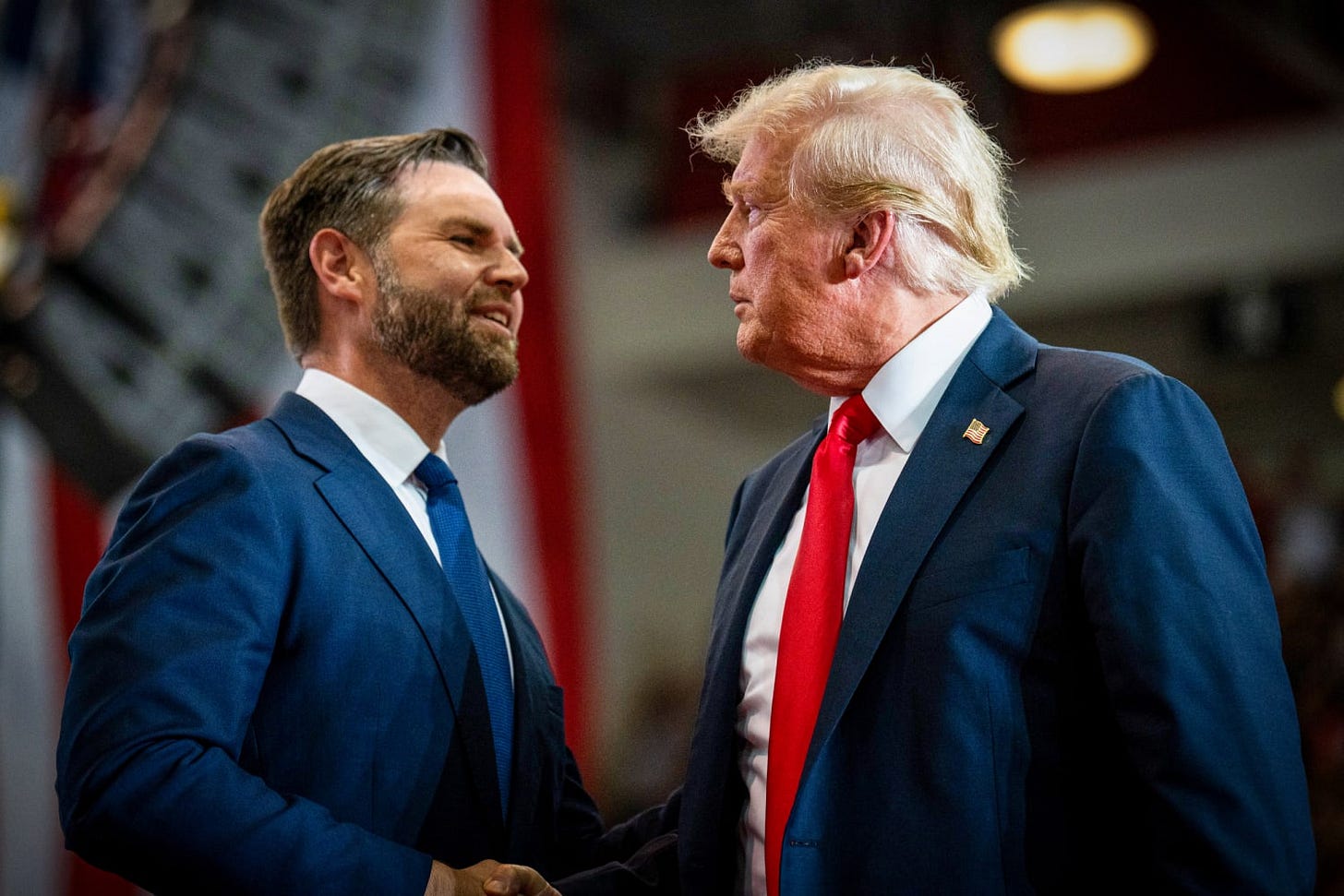


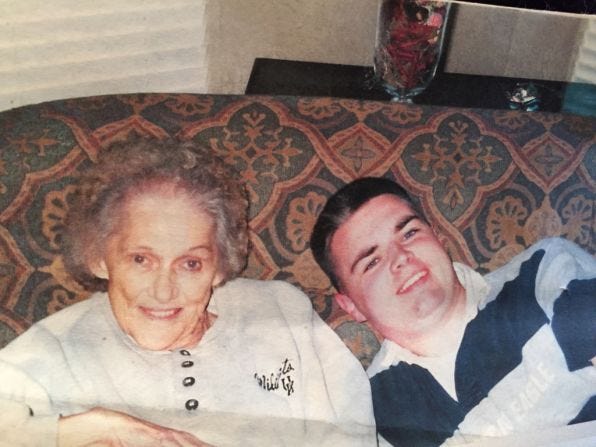
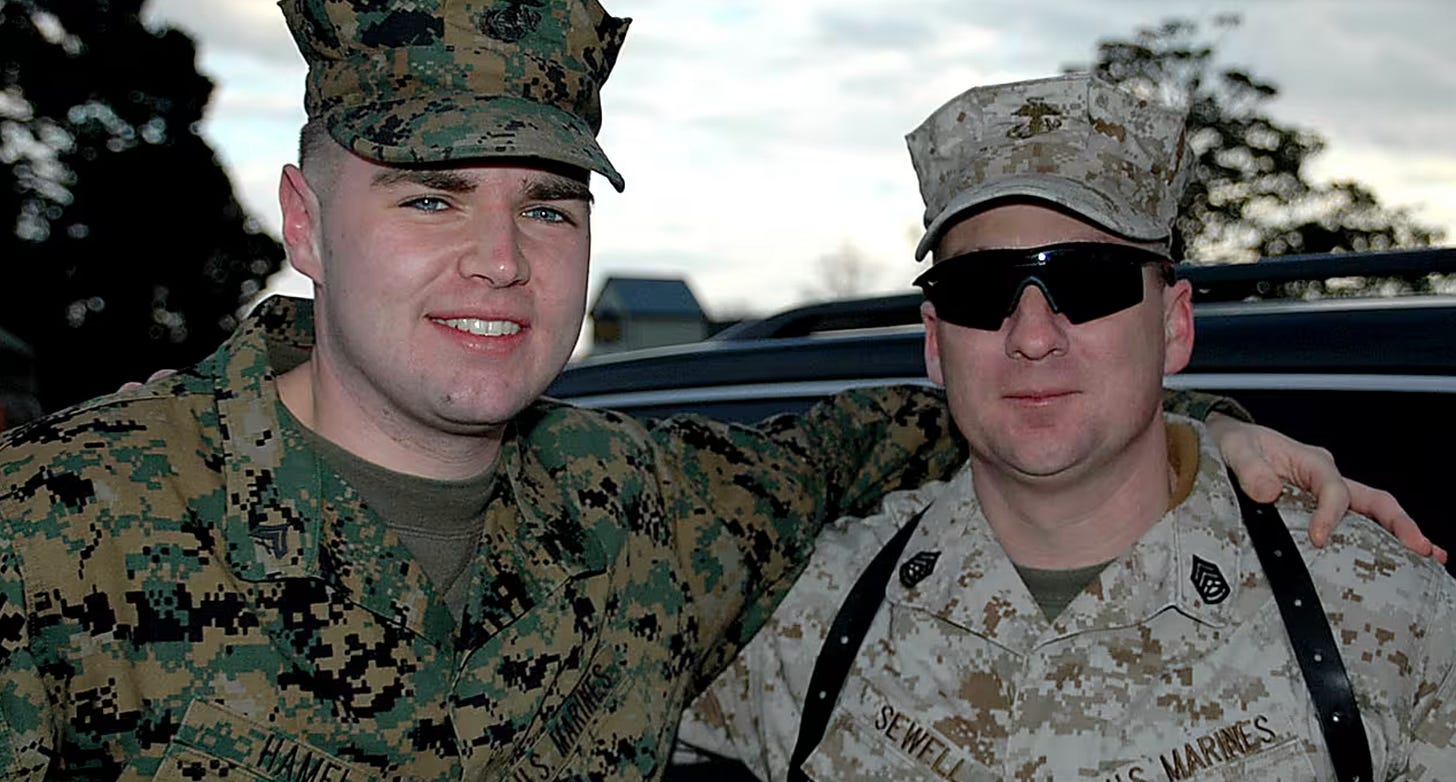
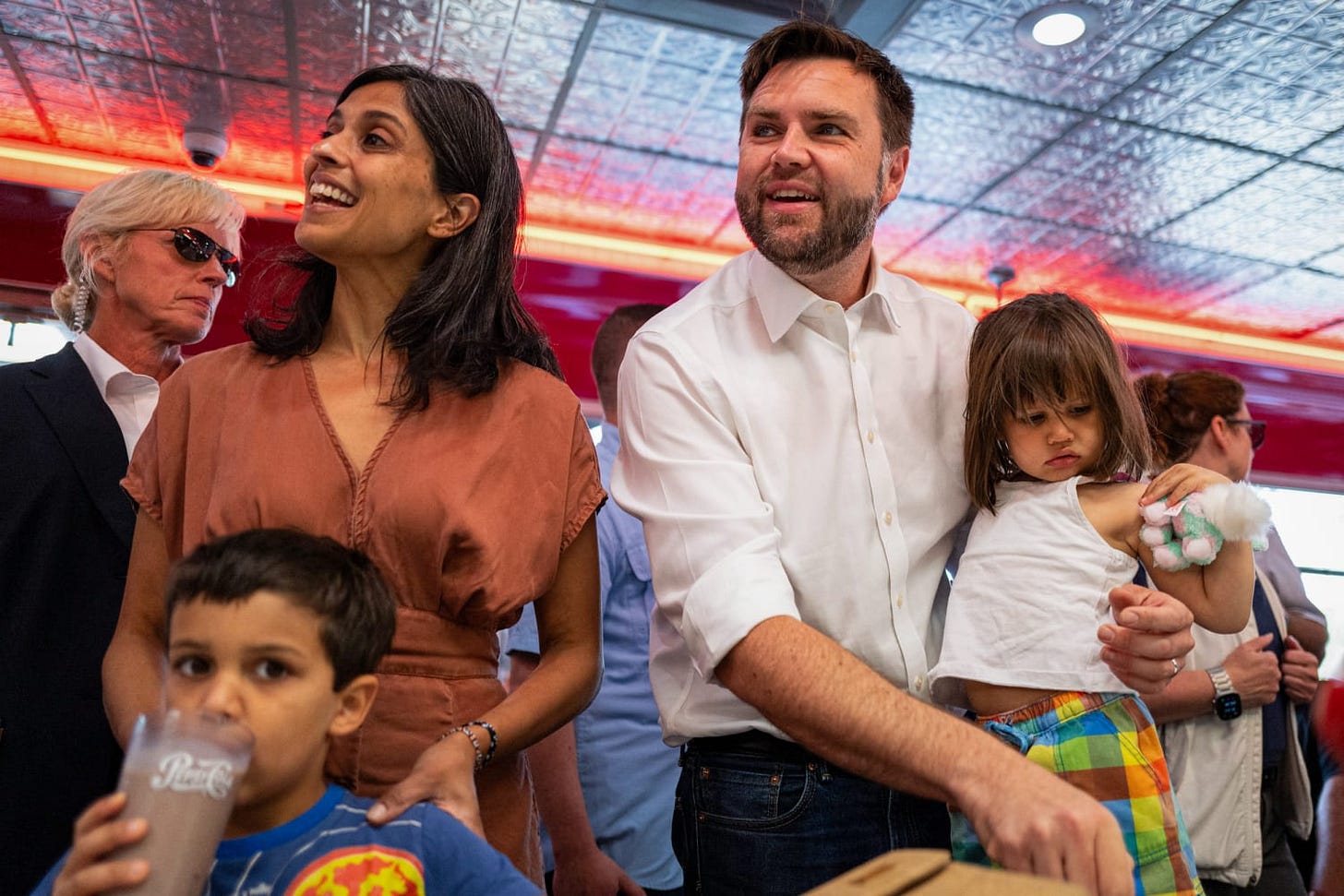

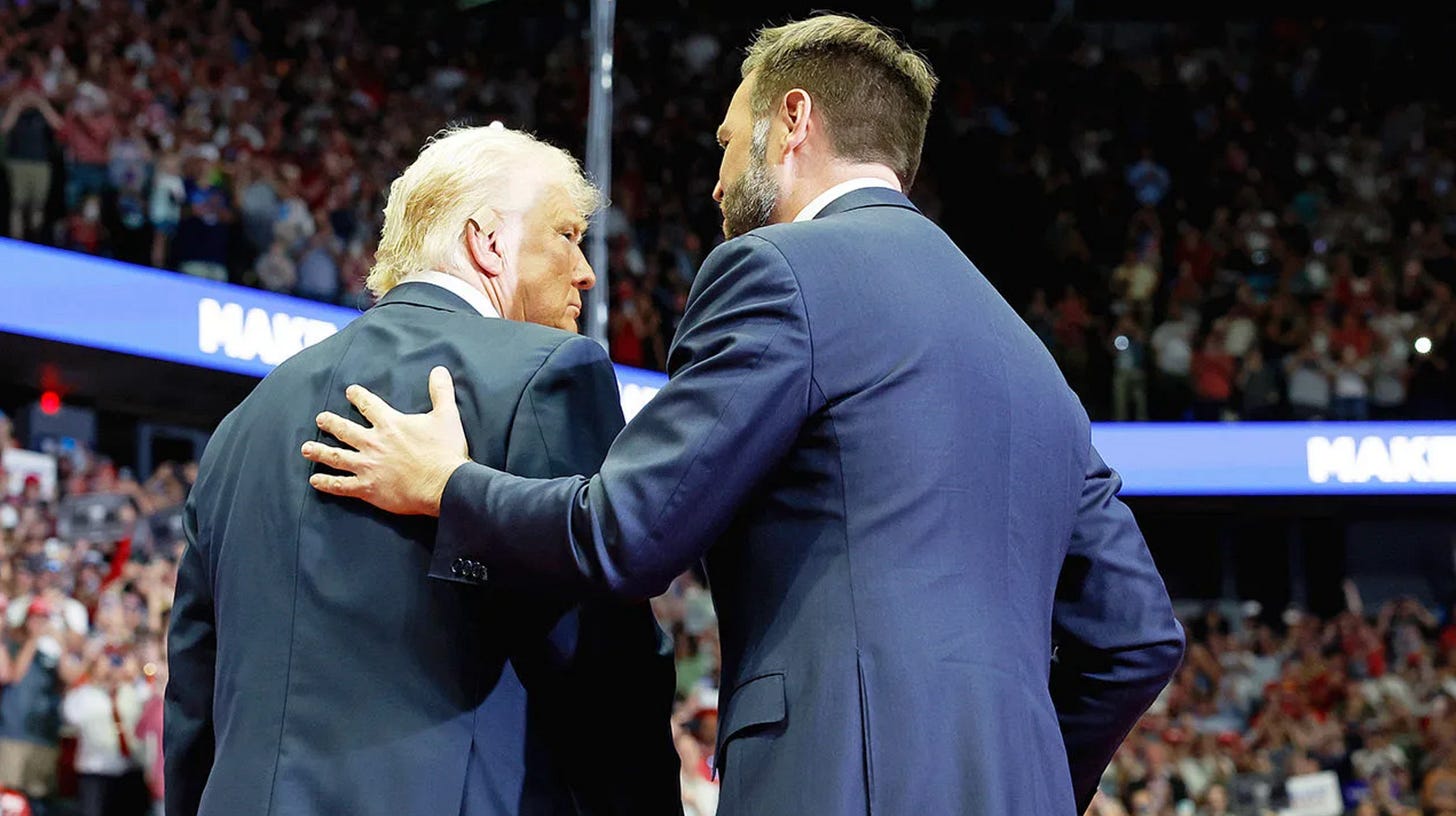

It seems to me that people like Vance and Trump, who both came from highly dysfunctional families, tend to seek power and influence through political positions. It’s understandable, given their emotional baggage, but concerns me because they are looking for power over people instead of service to the people.
I find the observation that he would become interested in the hobbies and interests of his mother’s boyfriends so that they would like him very telling. It was a foreshadowing of him now. First he says he is never a Trump man and now he’s the ultimate “pick-me” boy. It’s gross.